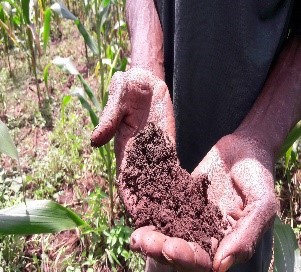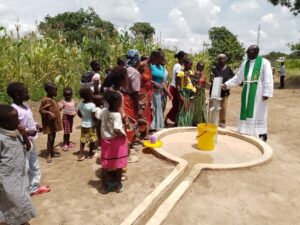ZAMBIA: Agro-ecology, a Solution to Broken Food System

Musamba Mubanga, Caritas-Zambia
The agricultural sector is key to the growth of the Zambian economy and generates between 18 and 20% of the Gross Domestic Product (GDP). The sector provides the main support for the rural economy as about 69% of the Zambian population depends on agriculture and it remains the main source of income and employment for rural women who constitute 59% of the total rural population.
Although the agriculture sector has registered positive growth, it is not sufficiently diversified. It is dominated by 18% crop production, especially maize. This is because until 2015 government policies such as Farmer Input Subsidy Programme (FISP) and crop marketing had been putting emphasis on maize. As a result, 80% of small scale farmers are involved in maize farming. Furthermore, the greater part of government budgetary allocation to the agriculture sector goes towards maize production and marketing.
Major challenges of the agricultural sector include overdependence on rain-fed agriculture, especially by small scale farmers; over-dependence on expensive, environmentally unfriendly chemical fertilizers; promotion of high mechanized agriculture and unsustainable farming practices; poor agricultural extension services; chaotic crop marketing arrangements and politicization of the Farmer Input Support Programme (FISP).
Other challenges include climate change, land grabs and infestation of invasive species such as army worms and stalk borers. These factors are now greatly impacting the sector. In a nutshell, the slow growth recorded in the sector is mainly due to government policies that do not favour agro-ecology.
Around the world, agro-ecology has been identified as a practice, a science and a growing movement that regenerates relationships among people, food and ecosystems. As such at national level, it is important that government works with various stakeholders working in different sectors to discuss the present state and future possibilities of agro-ecology.
The most echoed points include policy to focus on consumers and make them realise the need to consume healthy foods; the need to showcase how agro-ecology practices could feed the nation through continuous support of farmers practicing agro-ecology; emphasizing the link of health systems from the soil to the food produced for consumption; continuous promotion of indigenous seeds; and promotion of organic farming and organically produced food in the food supply chain.
 This includes engagements on nutrition and agriculture production and also networking with Civil Society Organisations to promote agro-ecology. Currently, government is engaged on the national agriculture policy and programmes for consideration of the pro-poor and promotion of low farm inputs that are eco-sustainable. The messages border on policy advocacy for agro-ecology and seed laws that favour the rights of farmers to continue saving, sharing and trading their own seed for consumer rights, and the protection of Zambia’s food sovereignty and traditional seed systems
This includes engagements on nutrition and agriculture production and also networking with Civil Society Organisations to promote agro-ecology. Currently, government is engaged on the national agriculture policy and programmes for consideration of the pro-poor and promotion of low farm inputs that are eco-sustainable. The messages border on policy advocacy for agro-ecology and seed laws that favour the rights of farmers to continue saving, sharing and trading their own seed for consumer rights, and the protection of Zambia’s food sovereignty and traditional seed systems
Advocacy engagements aim at promoting equitable access to food and safe water for the poor and vulnerable. This is done through empowerment of communities to enable them challenge attitudes, systems and institutions that impoverish them. Farmers are empowered with skills to engage in climate change adaptation and mitigation initiatives that will assist the communities to build resilience so as to reduce vulnerability and contribution to reduced negative impacts of climate change.
Furthermore, all community programmes undertaken must enhance the efforts of communities to promote sustainable livelihoods, increased food and nutrition, income security and ultimately contribute to the national goal of poverty eradication. All actions undertaken must build the capacity of dioceses in disaster risk reduction and climate change adaptation and mitigation in order to make the community resilience and reduce vulnerability to climate change impacts and its effects.
There is need to lobby government for the implementation of plans, policies and laws that are responsive to the effects of climate change. Furthermore, government programmes on climate change ought to be monitored in order to enhance transparency and accountability. It is believed that the promotion of climate change adaptation and mitigation is integral to the attainment of better household incomes, food security and improved nutrition
It is worth emphasising that the promotion of agro-ecology has been appreciated as a critical strategy with low external input and centres on food production that sustains the health of soils, ecosystems and people, combining traditional innovations and science to benefit the shared environment and a good quality of life for all involved in the ecosystem.
It is for this reason that we must promote household nutrition by strengthening community capacity to transform community food practice and improve the wellbeing of communities by influencing behavioural change. This ensures that as much as possible, small scale farmers start to see agriculture as a business that should address the three dimensions of sustainable development work on sustainable food systems.


